Ditapis dengan
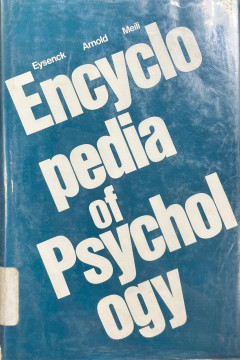
Encyclopedia of psychology
- Edisi
- -
- ISBN/ISSN
- 0-8264-0097-3
- Deskripsi Fisik
- xviii, 1187 p. ; 34 cm
- Judul Seri
- -
- No. Panggil
- R.150.321 ENC
- Edisi
- -
- ISBN/ISSN
- 0-8264-0097-3
- Deskripsi Fisik
- xviii, 1187 p. ; 34 cm
- Judul Seri
- -
- No. Panggil
- R.150.321 ENC
Congress an The Bureaucracy
- Edisi
- -
- ISBN/ISSN
- 0-300-02345-6
- Deskripsi Fisik
- -
- Judul Seri
- -
- No. Panggil
- 353.007.21 ARN c
- Edisi
- -
- ISBN/ISSN
- 0-300-02345-6
- Deskripsi Fisik
- -
- Judul Seri
- -
- No. Panggil
- 353.007.21 ARN c
TNI bukan Tentara Rakyat
- Edisi
- Cet. 1
- ISBN/ISSN
- 979-96038-0-3
- Deskripsi Fisik
- xviii+ 191 hlm.; 19 cm.
- Judul Seri
- -
- No. Panggil
- 355.009 PON t
- Edisi
- Cet. 1
- ISBN/ISSN
- 979-96038-0-3
- Deskripsi Fisik
- xviii+ 191 hlm.; 19 cm.
- Judul Seri
- -
- No. Panggil
- 355.009 PON t
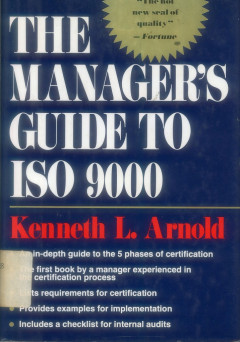
The Manager's Guide To ISO 9000
- Edisi
- -
- ISBN/ISSN
- 0-02-901035-7
- Deskripsi Fisik
- xi, 377 hlm.; 24 cm
- Judul Seri
- -
- No. Panggil
- 658.562.0218 ARN m
- Edisi
- -
- ISBN/ISSN
- 0-02-901035-7
- Deskripsi Fisik
- xi, 377 hlm.; 24 cm
- Judul Seri
- -
- No. Panggil
- 658.562.0218 ARN m

Comparative Public Policy: The Politics of Social Choice in Europe and America
- Edisi
- -
- ISBN/ISSN
- -
- Deskripsi Fisik
- 289 hlm. ; 23 cm.
- Judul Seri
- -
- No. Panggil
- 320.373 HEI c
- Edisi
- -
- ISBN/ISSN
- -
- Deskripsi Fisik
- 289 hlm. ; 23 cm.
- Judul Seri
- -
- No. Panggil
- 320.373 HEI c
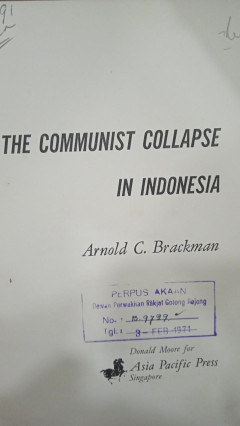
The Communist Colapse in Indonesia
This book discusses the downfall of communism in Indonesia. It contains 17 chapters explaining the mephitic climate, the rise of Indonesian communism, list to port, the masterplan, enemies of the people, night of the generals, Sukarno miscalculations, Gestapu or Gestok, the debacle on Java, a final solution, why the Communists failed, impact on Peking, impact on Moscow, the "Cornell Paper", Vie…
- Edisi
- -
- ISBN/ISSN
- -
- Deskripsi Fisik
- 20 cm. ; 264 hlm. ; index.
- Judul Seri
- -
- No. Panggil
- -
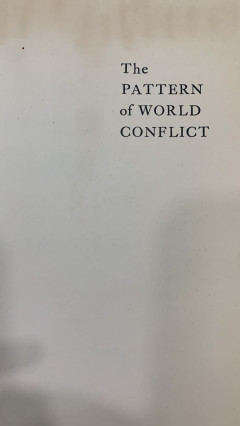
The Pattern of World Conflict
This book discusses the conflicts of the northern hemisphere after World War II. The book consists of six chapters divided in multiple parts about the aftermath of war and the end of the neo-liberal utopia, Atlantic world and Eurasian bloc, defense of the West such as the Cold War, the economics of a transition period, the plan era, and the patterns of conflict. This book is suitable for resear…
- Edisi
- 1
- ISBN/ISSN
- -
- Deskripsi Fisik
- 15cm; vi+250hlm; index; app.
- Judul Seri
- -
- No. Panggil
- 327 ARN p
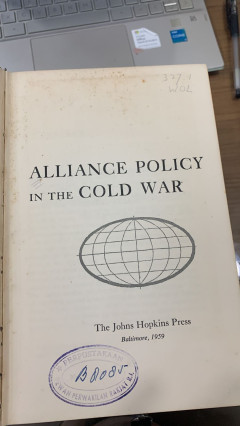
Alliance Policy in the Cold War
This book discusses the alliance policy between the United States and the Soviet. The book consists of ten chapters about the stresses and strains in the Cold War, coalition policy and the concept of world order, the American ethos and the alliance system, collective defense versus collective security, the evolutions of collective security under the United Nations charter, the military commitme…
- Edisi
- -
- ISBN/ISSN
- 59-10764
- Deskripsi Fisik
- 20cm;ix+313hlm; index;ilus
- Judul Seri
- -
- No. Panggil
- 327.1 a
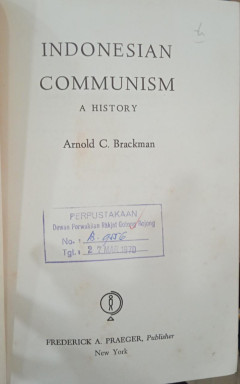
Indonesian Communism
This book discusses the setting of communism in Indonesia which resulted in the biggest communist party in the country, Partai Komunis Indonesia (PKI). It contains 24 chapters explaining the beginning of communism influence in Semarang, an infantile disorder, how the party got its name as the "illegal-PKI", Asia for the Asians, the August Revolution, the first Colonial War, the road to Madiun, …
- Edisi
- -
- ISBN/ISSN
- -
- Deskripsi Fisik
- 23 cm.; xvi+336 hlm. ; index.
- Judul Seri
- -
- No. Panggil
- 321.84.991 BRA i
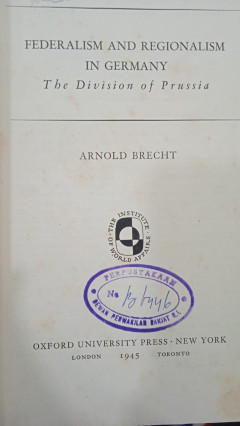
Federalism and Regionalism in Germany
This book discusses the issues from a Research Project on Germany's Position in European Postwar Reconstruction. It contains 16 chapters explaining political differences of American and German federalism, Prussia, Prussianism, and the Prussians, Bavaria, regional differences in political opinions, the distributions of powers of American and German federalism, federalism in practice, the governm…
- Edisi
- -
- ISBN/ISSN
- -
- Deskripsi Fisik
- 21 cm. ; xvi+202 hlm. ; index.
- Judul Seri
- -
- No. Panggil
- 321.021 BRE f
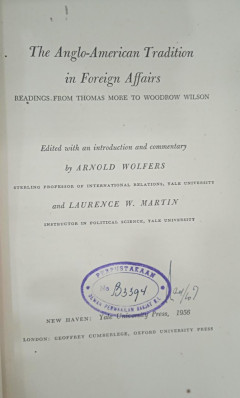
The Anglo-American Tradition in Foreign Affairs
This book discusses the introduction of political theory and international relations, and commentary of foreign affairs from various respectable American political figures namely Sir Thomas More, Francis Bacon, Thomas Hobbes, John Locke, Bolingbroke, David Hume, Adam Smith, Adam Ferguson, Edmund Burke, Thomas Paine, Alexander Hamilton, Thomas Jefferson, William Godwin, Jeremy Bentham, Richard C…
- Edisi
- -
- ISBN/ISSN
- -
- Deskripsi Fisik
- 23 cm. ; xxvii+285 hlm. ; index.
- Judul Seri
- -
- No. Panggil
- 327 WOL a
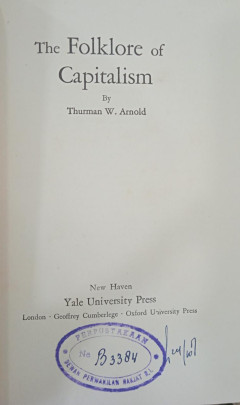
The Folklore of Capitalism
This book discusses the personification of capitalists institutions from the point of view of a psychologist to create a learning platform for social problems. It contains 14 chapters about the systems of government and the thinking man, the psychology of social institutions, the folklore of 1937, the place of learning in the distribution of goods, the use of the language of private property t…
- Edisi
- -
- ISBN/ISSN
- -
- Deskripsi Fisik
- 21 cm. ; vii+400 hlm. ; index.
- Judul Seri
- -
- No. Panggil
- 339 ARN f

The Folklore of Capitalism
- Edisi
- -
- ISBN/ISSN
- -
- Deskripsi Fisik
- -
- Judul Seri
- -
- No. Panggil
- -
- Edisi
- -
- ISBN/ISSN
- -
- Deskripsi Fisik
- -
- Judul Seri
- -
- No. Panggil
- -

The Manager's Guide to ISO 9000
- Edisi
- -
- ISBN/ISSN
- 0-02-901035
- Deskripsi Fisik
- -
- Judul Seri
- -
- No. Panggil
- -
- Edisi
- -
- ISBN/ISSN
- 0-02-901035
- Deskripsi Fisik
- -
- Judul Seri
- -
- No. Panggil
- -

Dictionary Of Economics
- Edisi
- -
- ISBN/ISSN
- -
- Deskripsi Fisik
- viii, 356 hlm.; ilus, 21 cm.
- Judul Seri
- Everyday Handbooks
- No. Panggil
- R 330.3 SLO
- Edisi
- -
- ISBN/ISSN
- -
- Deskripsi Fisik
- viii, 356 hlm.; ilus, 21 cm.
- Judul Seri
- Everyday Handbooks
- No. Panggil
- R 330.3 SLO
Managing federalism studies in intergovernmental relations
- Edisi
- -
- ISBN/ISSN
- 0-87187/277-3
- Deskripsi Fisik
- xi, 246 p. : il. ; 22 cm
- Judul Seri
- -
- No. Panggil
- 353.929.0926 HOW m
- Edisi
- -
- ISBN/ISSN
- 0-87187/277-3
- Deskripsi Fisik
- xi, 246 p. : il. ; 22 cm
- Judul Seri
- -
- No. Panggil
- 353.929.0926 HOW m
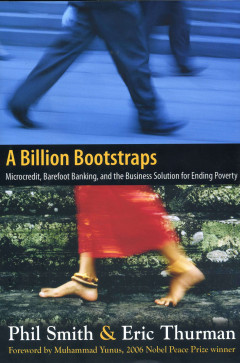
A billion bootstraps
A billion bootstraps unearths the roots of the micro credit revolution, revealing how the pioneering work of people such as Dr. Muhammad Yunus-winner of the 2006 Nobel Peace Prize- is giving hope to billions. Smith and Thurman also examine why traditional charity programs, while providing short-term relief, often perpetuate the problems they are trying to alleviate, and how applying investment …
- Edisi
- -
- ISBN/ISSN
- 978-0-07-148997-3
- Deskripsi Fisik
- Xiii, 224 hal. : il. ; 23 cm.
- Judul Seri
- -
- No. Panggil
- -

Essentials of Corporate Finanacial Management
This book about is an accessible approach with all mathemetical concepts introduced in an easy-to-follow style, comprehensive coverage of the key elements of pratical financial decision making, an extensive and comprehensive glossary of key financial terms, etc.
- Edisi
- -
- ISBN/ISSN
- 978-0-273-70508-6
- Deskripsi Fisik
- xix, 514 hlm. : il. ; 27 cm.
- Judul Seri
- -
- No. Panggil
- -
 Karya Umum
Karya Umum  Filsafat
Filsafat  Agama
Agama  Ilmu-ilmu Sosial
Ilmu-ilmu Sosial  Bahasa
Bahasa  Ilmu-ilmu Murni
Ilmu-ilmu Murni  Ilmu-ilmu Terapan
Ilmu-ilmu Terapan  Kesenian, Hiburan, dan Olahraga
Kesenian, Hiburan, dan Olahraga  Kesusastraan
Kesusastraan  Geografi dan Sejarah
Geografi dan Sejarah